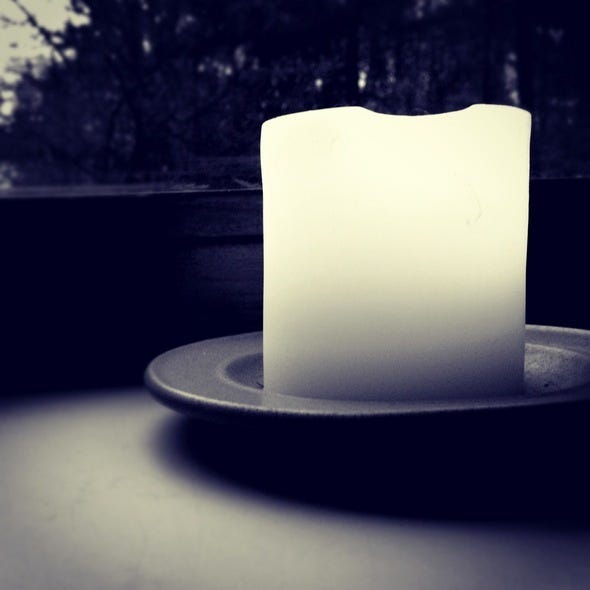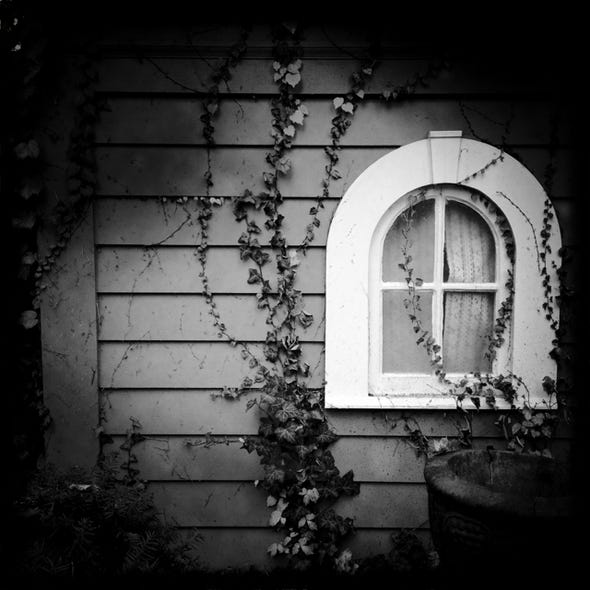It was an old house turned into an art gallery, bare wood floors and freshly painted, white walls. Perhaps ten women were wandering from room to room to browse the watercolours that hung, grouped in threes, on each partition. The paintings were spare and faint of colour; I remember lots of clouds. What stayed with me most is that someone had painted words across the walls, like lines from a poem, in a shade of white just a whisper darker and a whiff shinier than the painted plaster. If I looked at them dead on they vanished, but as I walked from room to room I could catch a glimpse of them, encouraging me to move this way and that until I could read what was written.
I thought this was ingenious.
There was a poetry workshop that day, May 14, and it was my birthday. The poet Joan Murray was in town to lead the gathering and I was wracked with nerves; it was my first time attempting to write poetry in a group setting, much less read it in front of others. The gallery was more than an hour away from home, and I had arrived early, not sure what to do with myself until the workshop would begin. The pale words that shimmered across the walls were a comfort to me as I wound my way through each room, passing time, trying to decipher them all.
I was alone in the very back room of the gallery when it happened; soft light filtered through a stained glass window and caught one word in its prism: numinous. Something about the old house with a new-found purpose, the word on the wall, the way the dust sifted through the streaming light filled me with a sense of awe. I had never heard the word numinous before, or if I had I didn’t pay attention to it. I said it aloud. Maybe I was reading it wrong. Did it say luminous? I looked again carefully and it was clearly the letter N. What did it mean? Something to do with clouds, or a veil of pale mist? Surely there was enough of that going on in the exhibit to support that meaning. I wrote the word down in my notebook and then it was time to join the others. The workshop was beginning.
Later that evening, after arriving back home, I looked up the word in my dictionary.
nu·mi·nous adjective \ˈnü-mə-nəs, ˈnyü-\ 1: supernatural, mysterious. 2: filled with a sense of the presence of divinity. 3: appealing to the higher emotions or to the spiritual, aesthetic sense.
Examples of NUMINOUS: Her poetry is filled with a numinous beauty. Some have sensed a numinous energy in the landscape around Sedona, Arizona.
Origin of NUMINOUS: Latin: numen, numin - ‘divine will.’ First known use: 1647.
And so, a very old word that I had never formally met.
My search went further, exploring sources of its use online, in literature, in poems. I began to use it in my own work, adopted it into my own lexicon. But mostly I tried to understand it and let it have meaning in my life. I had a sense of the word that was beyond words; it was something I had experienced many times, in different ways. But one thing that felt wrong about the dictionary definition was the word supernatural. This did not fit.
“The numinous” can evoke the sense that there’s something more to our existence than just the material world, something beyond words, something we cannot express. A visceral experience of the spirit or soul. We all have these experiences, right here in the physical world, and while they might be part of a religious experience, they don’t have to be. There are some who say it can only be a religious impulse, but I believe it to be a human impulse that might take on a religious implication, to those who are religiously inclined. The supernatural rides awfully close to the superstitious, while the numinous is more of an experience of transcendence.
Think for a moment of the times throughout your life that you have felt awe. Perhaps it was after climbing a mountain, resting at the summit and seeing the world below from a point of view that left you breathless. I have felt it while walking in the woods early in the morning, when the first rays of light shimmer down through the trees and illuminate the scattered pine needles and leaves on the forest floor. If you have ever held your newborn child and looked into his or her eyes for the very first time, you know the numinous. There have been moments while l listened to music that have been numinous. Once I was in a crowd of twenty thousand people, all swaying and singing the same words, and then all became suddenly quiet as the violinist went into a rapturous solo. There was an electric atmosphere that charged the air, from the music, from the soaring hearts of the crowd. I felt as if my heart filled my body to overflowing; it was transcendent beyond words or understanding.
I have also felt it in a church, from the smallest empty chapel in West Falls, New York, to the grandest of all cathedrals, St. Peter’s in Vatican City. And even this is not supernatural or even religious, but a sense of awe brought on by the architecture, colour, fragrance, images, sounds and the awareness of antiquity and the centuries of human longing, suffering and joy that have taken place within the immense stone halls. I cannot know if the supernatural exists or not. Surely I have had times in my life when I thought it might be possible. But my understanding now is that it was first and foremost the numinous that I have known, something as mysterious as anything that might be considered supernatural.
Sex can also be numinous. It is obviously physical, but can be more transcendent than any other human experience. Sex has its own mystery, its own way of taking us beyond ourselves. Spirit-filled lovemaking is eternally procreative; even when we are no longer being biologically procreative, our intimacies with the one we love create a bond that is like creating a third person, a meshing of two spirits. It can create something beyond our individual selves. Sex is never a purely physical act. Even when it’s not perfect, or prosaic. Even when it is not initiated by love. The soul is savaged in acts of violence, like rape, not just the body. But when two people come together in mutual love and respect, sex is always numinous.
It’s important when a word comes into my life that I was not aware of before. For a while I will search for ways to use it. I will watch for it in my quotidian life, in the literature I read. Numinous is a word I had been waiting for. Eight letters that gave voice to a feeling that I had known forever. And while it most certainly can have meaning in a religious sense, over the time I have known the word it has slowly transformed into an anchor for my doubts. It has grounded my uncertainties by letting me know that it is enough to be human and to experience the mysterious and transcendent in a way that needs no other explanation. Like the evanescent words scrawled on the luminous white walls of that gallery many years ago, it has become a piece of my journey as a fleeting, breathing part of this world.








Well…I need to think about this. Numinous is a word I too have been searching for. I have had this feeling many times in my life and could never explain it clearly, whether out loud or in my head. My daughters always teased me when we traveled together to a beautiful place, the desert, beach or a historical city. I would stand there staring, absorbing the experience and say something silly like “look at the awesome power or nature” or “engineering” or “ art”. It’s become a family thing to say “the awesome power of” whatever. But I know they feel it too. And didn’t have words.
I love your phrase “a visceral experience of the spirit or soul. …experience of transcendence.” That’s it! It’s not religion, it is part of our essence, that 90% of our brain we don’t use. There’s something in all of us to have a numinous experience. Maybe some have lost the ability, never learned to tap into it, or rejected it.
Having such a beautiful word for this is …awesome!!! This was a wonderful read. I love listening to your words too. 😍😍💕
I was so happy to read your reflection on the “numinous.” I first heard the word some years ago when my friend, Fr. Joe, was studying once again the works of the German theologian Rudolf Otto. Apparently, it was Otto who brought the word into common usage in his 1917 book, “The Idea of the Holy: An Inquiry into the Non-Rational Factor in the Idea of the Divine and its Relation to the Rational.” Fr. Joe was ordained in 1956 and explained that Otto’s work and ideas were hugely influential during his seminary years, and not just on Roman Catholics, but on students of theology in many different religious traditions up to the late 1960s. There was a time, he said, “When Rudolf Otto was a name on everyone’s lips.” Imagine!
When Fr. Joe (who was a seminary professor himself) tried to explain the concept to me, it seemed at once totally obvious and completely obscure. But, I think that’s a function of the way academics think and write! The descriptions are always so abstract. You have to know what they’re talking about to know what they’re talking about. Your explanation is far better and immediately accessible.
In case you’re interested, here is what Otto wrote in trying to explain the idea (from Wikipedia): “The feeling of it may at times come sweeping like a gentle tide pervading the mind with a tranquil mood of deepest worship. It may pass over into a more set and lasting attitude of the soul, continuing, as it were, thrillingly vibrant and resonant, until at last it dies away and the soul resumes its “profane,” non-religious mood of everyday experience. [...] It has its crude, barbaric antecedents and early manifestations, and again it may be developed into something beautiful and pure and glorious. It may become the hushed, trembling, and speechless humility of the creature in the presence of—whom or what? In the presence of that which is a Mystery inexpressible and above all creatures.”
You and he are describing the same thing, but your musings are so much clearer. With your description, I think all of us can say, “Ah, yes! I know exactly what that is!” Thank you for bringing this lovely word and memories of my old friend back into my life today!